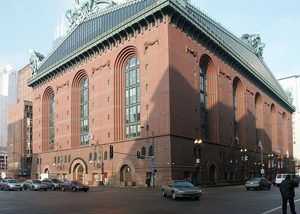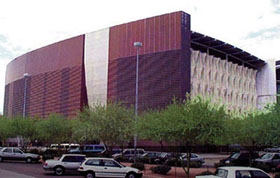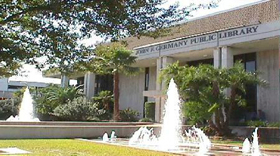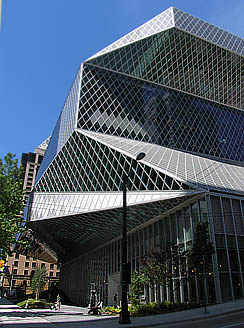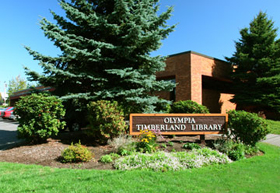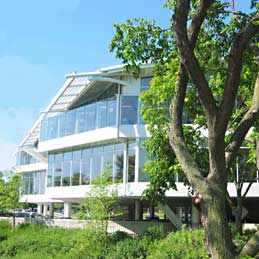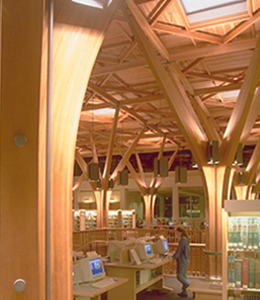The New Library: Digital Humanities and Knowledge in Transition
From digitalhumanities
Contents |
[edit] Digitizing the Humanities
Imagine a world in which a scholar no longer in California can access fragile texts from Rare Books Libraries all over the world. This is the world of digital libraries and digital archiving. In this online world, partnerships have formed between computer specialists, librarians and the academic elite to produce interesting and educational archival sites to serve the scholarly public. Projects like the "Text Creation Partnership", and University of Nebraska Digital Projects are commercial partnerships between publishers and scholars that create academic sites which provide access to fragile archival materials likely to degrade in a short time. This digital archiving is a great act of preservation and access.
Digital Projects encompass all possible areas of the humanities. Digital humanities sites are teaching guides, electronic databases, and archives. They include materials from professors, libraries, universities, and private scholars. Media on these sites includes video, encoded texts, images, spoken word, and manuscripts.
The potential for digital humanities is endless. Headliners in the field believe that in a short time, "Scholars will widely resort to computing simulations to analyze the past, construct the present, and anticipate the future. Scholars will not only deduce explanations. In future, they will 'grow' them in simulations (Symposium)." Not only will access to materials be limitless, the teaching and interpretation of these materials will be limitless, too.
American scholars are considered far behind in the digital world when compared with European and Canadian scholars. Many scholars have little understanding of the technological world. Understanding mark-up languages, html, and css is a valuable and necessary skill in today's libraries. A librarian who understands these things can go further in their career than those who don't. "The library, especially the research library, is a cornerstone, if not the very foundation of modern humanities. It is undergoing right now a complete digital transformation. In the coming decades...the entirety of our cultural inheritance will be transformed and re-edited into digital forms (McGann)."
[edit] Selected Digital Sites that Encompass the Humanities
Literature sites: Including text-encoded materials, which provide searchable, public access to a variety of materials.
Religious sites:
- The American Religion Data Archive, and various other comparative religion sites compiled by professors and scholars.
Ethics sites:
History sites:
Linguistics sites:
- Research and Resources from a linguistics professor
- E-MELD: Electronic Metastructure for Endangered Languages Data
Philosophy sites:
- Episteme Links, with 19,000 philosophical links and Philosopher's Quotations Database
Archiving the Web within the Web:
[edit] Digital Humanities Organizations and Projects
- Alliance of Digital Humanities Organizations
- University of Nebraska Digitization Project,About,Project List,Articles
- The Association for Computers in the Humanities ACH is an association devoted to aiding research in the humanities by way of computers.
- Digital Humanities at King's College London
A brief introduction to their digital humanities program: "The digital humanities comprise the study of what happens at the intersection of computing tools with cultural artefacts of all kinds. This study begins where basic familiarity with standard software ends. It probes how these common tools may be used to make new knowledge from our cultural inheritance and from the contemporary world. Several more or less synonymous terms are in current use, chief among them 'humanities computing'. Here we prefer 'digital humanities' for its emphasis on the integration of computing into the disciplines of the humanities and its transformation of them. Other terms, such as 'information and communications technology, name the amalgam of hardware and software but do not direct attention to scholarly concerns."
[edit] Sources
- Mattison, David. "The Digital Humanities Revolution." Searcher, May 2006, Vol. 14, Issue 5.
- "Collecting and Preserving Open Access Materials on the Web" "A Proposal to the Library of Congress from Cornell University"
- [http://www.brocku.ca/computingsymposium/welcome.html "Symposium: The Computer: The Once and Future Medium for Social Sciences and the Humanities". May2006. York University
- "Information Technology and the Troubled Humanities". McGann, Jerome. University of Virginia. Text Technology, Number 2, 2005.(PDF)
[edit] Public Libraries and Librarians in a Changing World
Beginning as early as the mid 1960s, and then rapidly accelerating in the 1990s digital technologies began to change the ways in which libraries had traditionally operated in the United States. Librarians, in fact were among the first non-military individuals to find a practical use for the Defense Advanced Research Projects Agency's (DARPA) new information sharing service which eventually would come to be known as the Internet.
Today collections increasingly consist of online data bases and office tools, in addition to printed materials, music, film, maps, microfiche, and other media. The roles of librarians are changing as well from that of educator to that of tech supporter. Instead of guiding expeditions into the worlds held within pages, they take patrons into the places behind and beyond the screen.
In order to better understand what these changes mean for library users and workers on the ground I interviewed five librarians in five different cities around the country. Curiously the one thing that all five had in common was the desire to remain anonymous. The conversations were often tense, even though my questions were relatively innocuous and innocent. These tensions reflect a debate which is raging (yes, raging) within the field: self proclaimed traditionalists versus self proclaimed forward lookers. Curious - that sounds familiar...
[edit] The Libraries
Harold Washington Public Library Chicago Illinois
Each and every library I call on this little adventure answers with a computer's voice. Always the voice is that of a woman. She speaks to me in English and then in Spanish. Usually this would bother me, but I like the evidence of outreach to non-English speaking patrons. I think of the Portland system and how their computer's voice speaks Vietnamese as well. After a brief interlude with her (wherein my entire vocabulary is restricted to ten numbered keys) an elderly man's voice comes on the line. He doesn't want to talk to me and repeatedly tells me that any questions about anything need to be emailed to the administration for comment. "I could get into serious trouble for talking to you at all" he says a couple of times. He characterizes the "librarian versus a large, very bureaucratic agency" as one in which the librarian must be very careful or risk repercussions. This sounds to me an awful lot like state sanctioned self censorship, but I don't say that. The Chicago library system has upwards of 80 branches, and any flier that's to be hung at any of them has to be submitted to and rubber stamped by central admin. He has worked there since 1991, at the "Central Information Center". Mostly his job consists of answering questions over the telephone and computer. He doesn't do so much general readers' advisory. In fact, the most common questions he gets are regarding genealogy! I find this shocking. Turns out it's always been pretty common but over the last six or seven years it's really gone through the roof.
So now we get down to business and I ask him how the internet has affected his job, his library and his patrons' experience. He grows animated. I'm really enjoying this conversation, and after checking with his desk mate (that's the other thing - everyone I talk too doesn't have time to be sitting around and shooting the breeze. They're at reference desks goddammit!) he seems to cotton to me too. "Two things" he says. "Business dropped off dramatically three years ago or so, and the good news is that it's coming back. Now that's the good news. People are beginning to realize that it (the internet) doesn't have any, or everything and that it's not accurate. Second thing is that it's frustrating because the quality of public life has been going downhill for a while now." He sites post offices as a good example of this phenomenon. "We've become the Phone Company!" And when I don't understand this remark he explains: "Nowadays we're directory assistance. People will call wanting contact information for businesses and a lot of these places hide their phone numbers so you can't get in touch we them. Companies don't want to be bothered, but we can find out how to get in touch with them." This is alright as far as he's concerned, but far from ideal. His job as a librarian is to PROVIDE INFORMATION. He says this in capitol letters. I agree enthusiastically. "I don't see us educating people anymore, I do see us making them technologically competent. I went into this field, and I think a lot of us did, to educate people. More and more that's not the case though. Are we technocrats or are we educators?" We go on in this vein for some time. He brings up another important trend: "Subject specialists" he says, "are being eliminated by attrition. Nowadays you don't have someone who knows the art department inside and out, or history, or business." I say "it's the deskilling of the trade". He agrees.
Burton Barr Central Library Phoenix Arizona
John F Germany Public Library Tampa Florida
I should have known better than to call Tampa. I lived in Tampa for three months and they were three of the strangest and most tragicomic of my life. I hate Tampa. I hate the climate, the racism, the layout. And now I hate the department supervisor for electronic reference and information JFG Public.
I knew from that this was going to be a difficult interview. Upon arriving telephonically in Tampa I was shuffled from underling to underling until I ended up at the desk of Madame Bureaucrat. Madame, as she shall hereafter be known is the principal librarian of the Tampa Public chain and has been involved there in some capacity since the mid 1980s. She spoke in sound bites. She seemed highly competent. Someday she will be my boss and I will resent her.
JFG primarily focuses on children's' programs
Seattle Public Library Seattle Washington
I am transferred by the very sweet "quick answers" boy to the reference desk at the beautiful new glass library in downtown Seattle. A woman answers the phone. She is all business. I am excited to begin and give her my spiel in my nicest, humblest, least threatening voice and she shuts me down. I am irritated. I come at her again and again she will have none of it. Several times she directs me to write an email to the administration and they will answer my questions - she will not and will not even tell me why. I get forceful, she gets downright bitchy. I thank her for her time and bid her farewell. This is my first, but not my last, encounter with people who will not talk to me.
As I mentioned above there is a curious tension that arises when one asks a librarian in a large public systems questions about his or her job, branch, or field. It is, in fact not unlike that which arises when one quizzes a military man about issues of national security. What, I wonder, are they hiding? What could they possibly be worried about? I am referred to "the administration" for all issues of "PR". This stymie is frustrating, but also enervating. It's a mystery! I love mysteries. I call the Capitol Hill Branch, betting that they'll be looser lipped (liberals always are!). It turns out that Seattle librarians are rarely tied to one location, and float from place to place - so it's not the location, in this case that counts. I get lucky regardless.
The woman I end up talking to is a bit rushed. She gets the bit in her teeth and won't stop talking until my interjections get really loud. She sounds youngish and has been working in the system since 1995. She describes her patrons as younger people: "urban youth" in their twenties and thirties, and the older people who live in apartments nearby. The hill is very urban - densely packed multi family homes and high rises according to her, though that's not how I remember it.
When I ask her what she sees happening in the next ten years she interjects with "I don't think anyone could predict that far into the future. Three years, perhaps, but ten? Unrealistic." She tells me that since the latest Seattle bond passed the SPL has been able to refurbish all of its branches as well as adding two brand new locations. This has increased circulation dramatically. It sounds as though the general mood is positive. A lot more emphasis has been put on providing internet connection to "off the street" patrons, which just means that they walk into the library bodily as opposed to calling or emailing. Also a 24 hour online chat service has been established, though when I asked with what success she did not have an answer for me. Most of all she sees her library bring "everyone up to speed on web 2.0" and (this really got me!) expanding service to refugee and immigrant populations to whom libraries and computers have been unavailable in the past.
At this point she's starting to want to get off the phone; she's said her piece and is not responding well to my attempts to further draw her out. When I ask what she would have if she could have everything she says "more of everything" without missing a beat and quickly excuses herself. My feelings are a little hurt, but I do my best to let it go.
Olympia Timberland Library Olympia Washington
See "Burton Barr", above.
[edit] The Conclusions, or Lack Thereof
As the title of this section suggests, I have yet to come to any firm conclusions. Really, who needs conclusions, anyway? There is clearly a transition occurring - one of culture as well as of methodology within the field. As a young person aspiring to librarianship it is a transition, and a discussion which it behooves me to understand and to take part in. I plan to continue interviewing librarians around the country - perhaps moving outside of the field of public the public library and into others. For a (potentially) complete directory of libraries in the United States please see the following web page: http://dir.yahoo.com/Reference/libraries/. It gives an idea of how vast the field is and how varied.
[edit] The Questions
- How long have you been with your library?
- Who are your patrons? What do they use your library for?
- How have you seen your library change?
- How has the advent of the Internet affected your services?
- How has it affected the patrons?
- Where do you see these changes leading you in the coming years?
- If you could wave a magic wand and change anything about your library, or about libraries in general, what would you change?
[edit] How to Make the Transition
According to Tennyson, a 19th century scholar, who was apprehensive of the outburst of knowledge: "Information comes, but wisdom lingers". This sentiment can now be applied to the outburst of informationin our 21st century as "information comes, but knowledge lingers". Academic libraries face significant challenges due to the vigorous change in the ability to understand the needs, various backgrounds and interests of the patrons. This duty is becoming more challenging because of the increased flow of information and consequentially, interest. Libraries are having to deal with this influx. The fact is that faculty and students respond to new technologies at different rates. Writer, Ronald Schuchard, believes physical books will be saved due to a revolution in the special collections of libraries. He believes that the special collections of libraries have an undertaking of teaching in the university that is integral and based in research and preservation and that there is proof that the revolution is underway. Not only this, but that the actual conception of the library is drastically changing.
 scholar- 3000 AD rediscovering books
scholar- 3000 AD rediscovering books
Evidence of this change is seen in the development of libraries following a new model of information organization, one that devalues physical books. Schuchard notes the Seamus Heaney Library in Queen's University in Belfast, lacks any book by the Novel laureate, nor does it hold a work of literature. However, it does have a room of "recommended textbooks" and "offprint materials" unavailable for long-term checkout and contains more computers than books. A conglomorate library located in Dublin, at Trinity College, is replacing their existing libraries. The new library will be focused on electronic resources and IT-founded teaching as well as "automated" library and building management systems. To go along with the electronic theme of the new library, they are considering replacing the term "library" with "cybrary".
Schuchard's optimism toward the special collection revolutions of Academic libraries is backed by recent seminars for graduates and undergraduates to establish a connection with rare/special book collections. He cites programs from the libraries of UCLA and Columbia University, though it can only be assumed that if at least two notable colleges are initiating seminars then others must be as well. Libraries are working on teaching the importance of books through courses on the value of archival research, the history of the book, and to help integrate student's work into special collections. Researching an outdated manuscript through CD-ROM does not allow the viewer to note the personality of the author through detailed clues of handwriting, the corrected and uncorrected mistakes and other such ephemera which may lead one to feel closer to the text, although there is a level of value in the new preservation modern technologies offer.
[edit] Innovation Diffusion Theory
Everett M. Rogers has a theory that there ar five attributes of innovations that relate to how one acclimates to new innovations. The attributes are:
- "relative advantage" - the degree to which a new innovation is viewed as being more advanced than the present technology
- "compatability" - how the innovation relates to current values, prior experiences, and the needs of future users
- "complexity" - if the new technology is user friendly
- "trialablity" - the amount of time one can practice new skills needed for the new innovation
- "observability" - if the outcome of the innovation is perceived by its potential users
Some of the questions posed in focus groups of librarians integrating themselves into new technology are:
- "Are laggards disenchanted with all computer-based technologies or have they simply not adopted them yet?"
- "Are they also the same faculty who do not use the library at all?"
- "To what extent do innovators use library resources and services?"
- "How can librarians become more effective "change agents" in the diffusion process"
- "How effective are the methods we are using to inform our faculty about our electronic resources and services?"
There are researchers who are facilitating focus groups and compiling theories and practices on how to integrate new technologies into libraries. Online databases are well on their way to claiming domination in the library. In the coming years there will be a productive place for both computer and book users. There is no definitive path one must choose such as deciding to be a Luddite or a cyborg. It is important to ask oneself questions such as what these focus groups are aiming toward in order to figure out the place for technology in your community's or college's library.
[edit] Here's a few digital humanities organizations:
- Association for Literary and Linguistic Computing [1]
- The Association for Computers and the Humanities [2]
- Association for History and Computing [3]
- National Initiative for a Networked Cultural Heritage [4]
- Canadian Society for Digital Humanities [5]
- Alliance of Digital Humanities Organizations [6]
- Umbrella organization for the ach, allc, cch will have a new open access, peer-reviewed journal [7]
[edit] Here's a few digital archive sites for you
- Electronic Text Center: 10,000 English literature texts included in a 70,000 text paced collection, including history, literature, philosophy, religion, history of science, and the languages: Latin, Apache, Japanese, and Chinese [8]
- American Memory- at Library of Congress including "two examples of being An American Time Capsule: Three Centuries of Broadsides and Other Printed Ephemera [9]
- American Notes:Travels In America, 1750-1920 [10]
- Write American Fiction, 1851-1875 [11]
- The William Blake Archive [12]
- The Best History Sites [13]
- Language and Linguistics [14]
- Religious Studies Web Guide [15]
[edit] Library Aesthetics
goals of aesthetic:
- timeless design
- compatibility with future and present technology
- trend library aesthetics moving from "boxey 1960's and 70s no frill" to natural light and high tech user friendly structures
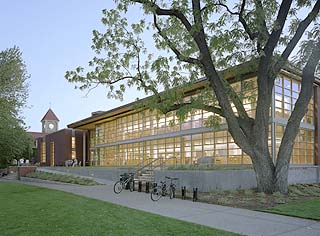 Penrose Memorial Library at Whitman
Penrose Memorial Library at Whitman
[edit] SOURCES
- Mattison, David. "The Digital Humanities Revolution" Searcher; Issue 5 (2006) p25-34
- Tonkery, Dan. "Rethinking the Role of the Subscription Agent in the Transition from Print to Digital Collections" Publishing *Research Quarterly; Winter (2003) p34-55
- Kram, Lorraine. "Why continue to be a Depository Library if it is all on the Internet anyway?" Government Information Quarterly; Vol. 15 Issue 1, (1998) 15p
- Schuchard, Ronald. "Excavating the Imagination; Archival Research and the Digital Revolution" Libraries and Culture, Vol. 37, No. 1 (2002)
- Starkweather, Wendy M. "Faculty Response to Library Technology: Insights on Attitudes" Library Trends; Spring, Issue 4, p640 (1999)
- Harrington, Drew. "Six Trends in Library Design" Library Journal Issue 20, p12 (2001)

